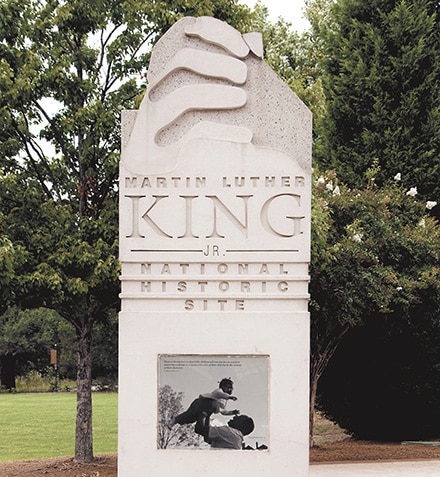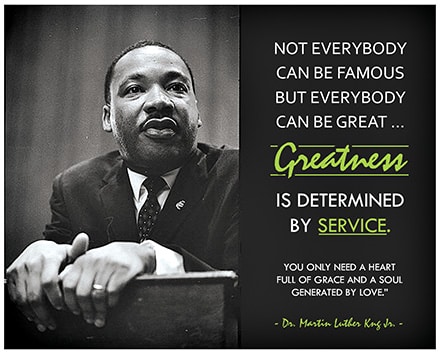
No different from any of the generations before, today’s youth have been saddled with their fair share of unflattering characterizations. What does seem different, however, is something remarkable: they seem to be going about life as though they are the realization of Dr. King’s dream. They own it – in sort of legacy-in-action kind of way. Not since the turbulent times of the 60’s has a generation been so quick to buck the status quo and actively seek social justice. For these ‘guys and gals’ change is imperative . . . they do not favor asking for permission and are not particularly keen on waiting for someone else to make change happen. Our major mistake has been to confuse their hubris and gumption for entitlement and disrespect. If we were to stop and take a closer look, we might notice that a quiet revolution is taking place, peacefully and persuasively. Millenials seem to have taken the idea of being the change they wish to see in the world to heart.
“Injustice anywhere is a threat to justice everywhere.” – Martin Luther King, Jr.
None of this, let’s call it ‘tenacity’, should be too peculiar. If you ask them, they will eagerly tell you that much of their philosophy and approach to life stems from what we (older generations) have taught them and what they have observed. For many of us, especially those like myself who had the benefit of hearing first-hand accounts from family and friends of the strains and gains of the Civil Rights Movement, Dr. King’s legacy reflects bigger cultural discussions about inequality and brotherhood in profoundly inspirational and deeply personal ways.
Millennials view this period in our nation’s history from a different vantage point; the luxury of time past has afforded them a broader perspective. They take into account the fact that many regarded Dr. King, Jr. as an inflammatory and dangerous rebel who pushed against the evils of Jim Crow, segregation and the otherwise accepted status quo. ‘Gen-Y’ers’ do not seem to overlook that irony but rather draw inspiration from it – as catalysts for change.
The kind of change they seek to create requires leadership, the kind of leadership that requires extraordinary courage and relentless dedication, the very kind Dr. King, Jr. demonstrated. Those of us, who are older, and presumably wiser, know that fighting the good fight and achieving your dreams require more than just an active imagination and wishful thinking – It is hard work. Therefore, as a mother of three young men, it made sense for me to stop and ask this question, “Aside from getting a day off from school, what does ‘Dr. King, Jr. Day’ mean to you and your generation?”
Here is a bit of what my sixteen-year-old, Johnathan Taylor, had to say:
“[Dr. Martin Luther King, Jr. Day] . . . has been celebrated even before we were born and we have been taught about him since we were in kindergarten. Every time the day comes, we hear the “I Have a Dream” speech and we see the television programs . . . but they aren’t able to explain the deep impact that this man had not only on American history, but world history. His dream shapes our reality. His words transformed a nation and defined a generation. They are the words of a man who stood up against oppression and peacefully led a country out of darkness by teaching everyone how to love.
My friend Jemini Powell said, ‘He was a man who taught people to unite without the use of violence.’ That is what is amazing: no violence! He stood up against segregation; he marched for equality, sat in, boycotted, and preached for change, but never did he use physical force to make his point or to win his fight; he did it with love. Even when they bombed his house, he still loved. Even when he was jailed, he still loved.’
“Darkness cannot drive out darkness; only light can do that. Hate cannot drive out hate; only love can do that.”
– Dr. Martin Luther King, Jr.
“As an African American, it means more to me than just a day off. It is a day to celebrate a man who gave his life to make a better world for me to live in today, to remind a country still struggling with injustices what loving one another truly means, and to show that anyone who loves his fellow man can change the world.”
Although many things have changed since the Civil Rights Movement, the remedies proposed by Dr. King – nonviolence, service, brotherhood – remain as relevant as ever. His teachings continue to help bridge divided communities across the U.S., offering a chance for dialogue, discussion, healing and growth.
Despite the negative reports we hear, the news is replete with stories of young people taking a stand against injustices, such as bullying, discrimination, poverty and violence. They are rolling up their sleeves and have logged more volunteer and community service hours prior to entering college than any generation before. It is encouraging to witness this next generation stake claim to our future, with intention and purpose, settling for nothing less than that success we all seek. They inspire us and remind us that we are all empowered to own a piece of the dream, young and old alike. Thanks to the life and legacy of Dr. Martin Luther King, Jr., we have been given a roadmap to tackle our nation’s most critical issues – together.
Keisha Cameron is the Chief Exchange Officer with The Exchange, LLC. Johnathan Taylor-Anderson is a Junior at Grayson High School.
Photo: Martin Luther King, Jr. photographed by Marion S. Trikosko, 1964. LC-DIG-ppmsc-01269 Source: Library of Congress


